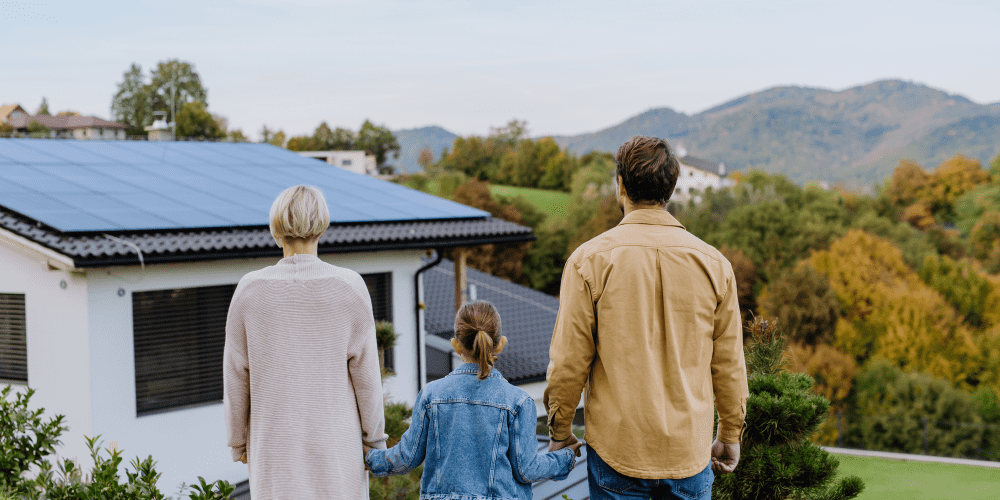How to have solar panels installed in the UK
Thinking of having solar panels installed in the UK? Here’s what you need to know about the process, from getting quotes to installation day, and receiving money for exporting energy back to the grid.
Solar panel installation in the UK: A great time to invest
There are several compelling reasons why more than 1.5 million solar panels have been installed on homes in the UK, with the number of panels fitted in the first half of 2025 up 22 per cent on the year before.
Whether it's lower energy bills, being paid to send electricity back to the grid, potentially boosting the value of your property, or generating renewable power, solar panels offer many benefits.
Furthermore, zero VAT on solar panels, local and UK-wide incentives, and installation becoming more affordable mean there hasn’t been a better time to invest.
Is my property suitable for solar panels?
Whether it's a residential, commercial or agricultural property you are thinking about adding solar panels to, there are a few things that’ll help you determine whether you have the optimal setup:
- Your roof has at least 15–25 m² of clear, mostly unshaded space
- It's south-, east-, or west-facing
- The roof is structurally sound and not due for repair since solar panels typically last 25–30 years
- You use electricity during the day (e.g. work from home, run appliances, charge devices)
- You’re not in a conservation area or subject to planning restrictions
Even if your property doesn’t meet all of the above there are a number of other alternatives, such as ground-mounted panels or installing panels at an angle on a flatroof.
Connecting with local solar panel installers can provide a better understanding of how suitable your property is, as a professional will conduct a site assessment and design the optimal setup for you.
Save up to £800 a year
Installing solar panels can drastically reduce your electricity bills – and your reliance on the grid.

The installation process
- Assessment: Once you reach out to installers near you, a professional will assess your property, energy usage and roof suitability. They will take into account factors such as roof space, budget, and the energy efficiency of your home.
- System design: A solar system will be specially designed for your home to ensure maximum efficiency, with consideration for how many panels your roof can accommodate, and whether extras like a battery and monitor are necessary.
- Permissions and notifications: Planning permission is usually not required due to permitted development rules. The installer must notify your local Distribution Network Operator (DNO).
- Preparation: Scaffolding is erected for safe roof access. The installer confirms delivery and conducts a pre-installation inspection.
- Installation: The installation usually takes 1–2 days. Panels are mounted and connected to the inverter, which links to your fuse board. The system is tested for performance.
- Certification: After testing, you’ll receive an Electrical Installation Certificate, Building Regulations Compliance Certificate, product warranties and the MCS certificate—required to export energy.
- SEG registration: With your MCS certificate and a smart meter, you can apply for the Smart Export Guarantee (SEG). Once you've selected a provider, account activation takes a few weeks.
In total, the process takes just a few weeks, with the installation work lasting 1–2 days and the scaffolding only being in place briefly.
How much does it cost to install solar panels in the UK?
The cost of solar panel installation in the UK typically ranges between £5,000 and £8,000 for a standard home setup, with the average cost sitting around £6,100, according to MoneySavingExpert.

A larger home with more roof space can expect to pay around £10,000 for a setup with extra panels.
A battery system that’ll cover the needs of most homes will cost an additional £8,000 to £9,500. While the battery will allow you to store excess energy, it is considered optional
While the upfront investment may seem steep, solar panels are becoming more affordable for UK homes.
In the 2024–25 fiscal year, the median cost per kW dropped by roughly 20 per cent compared to the previous year, according to the Department of Energy Security and Net Zero.
Incentives and financing
While fully funded solar panels are generally only available to low-income households, most homeowners can benefit from 0% VAT, payment plans, and energy export schemes to make solar affordable.
Some installers offer financing options or payment plans, and some banks offer green loans to help with costs.
Finally, the SEG scheme allows you to be paid for the energy you export back to the grid. Aside from safety and convenience, using a certified installer is also essential if you want to sign up to the SEG
Want to be put in touch with local solar installation companies?
If you're considering solar panels, take a few minutes to fill out our form, and we'll match you with solar panel installers near you.
Our service is free and non-binding, and consumer organisation Which? recommends getting quotes from three different providers before choosing what’s best for you.









